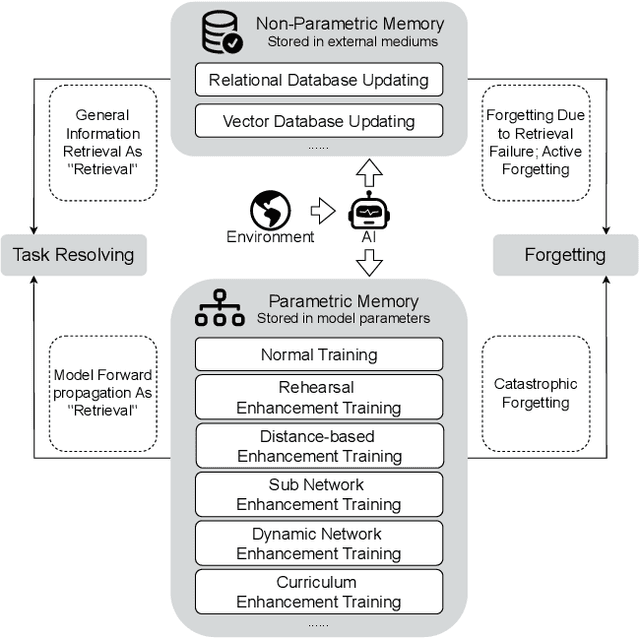Zihong He
Human-inspired Perspectives: A Survey on AI Long-term Memory
Nov 01, 2024



Abstract:With the rapid advancement of AI systems, their abilities to store, retrieve, and utilize information over the long term - referred to as long-term memory - have become increasingly significant. These capabilities are crucial for enhancing the performance of AI systems across a wide range of tasks. However, there is currently no comprehensive survey that systematically investigates AI's long-term memory capabilities, formulates a theoretical framework, and inspires the development of next-generation AI long-term memory systems. This paper begins by systematically introducing the mechanisms of human long-term memory, then explores AI long-term memory mechanisms, establishing a mapping between the two. Based on the mapping relationships identified, we extend the current cognitive architectures and propose the Cognitive Architecture of Self-Adaptive Long-term Memory (SALM). SALM provides a theoretical framework for the practice of AI long-term memory and holds potential for guiding the creation of next-generation long-term memory driven AI systems. Finally, we delve into the future directions and application prospects of AI long-term memory.
AFSPP: Agent Framework for Shaping Preference and Personality with Large Language Models
Jan 05, 2024



Abstract:The evolution of Large Language Models (LLMs) has introduced a new paradigm for investigating human behavior emulation. Recent research has employed LLM-based Agents to create a sociological research environment, in which agents exhibit behavior based on the unfiltered characteristics of large language models. However, these studies overlook the iterative development within a human-like setting - Human preferences and personalities are complex, shaped by various factors and subject to ongoing change as a result of environmental and subjective influences. In light of this observation, we propose Agent Framework for Shaping Preference and Personality (AFSPP), exploring the multifaceted impact of social networks and subjective consciousness on LLM-based Agents' preference and personality formation. With AFSPP, we have, for the first time, successfully replicated several key findings from human personality experiments. And other AFSPP-based experimental results indicate that plan making, sensory perceptions and social networking with subjective information, wield the most pronounced influence on preference shaping. AFSPP can significantly enhance the efficiency and scope of psychological experiments, while yielding valuable insights for Trustworthy Artificial Intelligence research for strategies to prevent undesirable preference and personality development.
 Add to Chrome
Add to Chrome Add to Firefox
Add to Firefox Add to Edge
Add to Edge